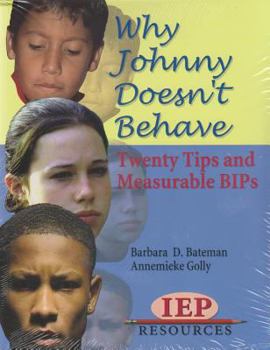Why Johnny Doesn't Behave: Twenty Tips and Measurable BIPs
Avoid behavior problems and write better behavior intervention plans (BIPs)Authors Drs. Barbara Bateman and Annemieke Golly focus on 20 concrete "tips" to help you avoid behavioral problems, including... This description may be from another edition of this product.
Format:Paperback
Language:English
ISBN:1578614902
ISBN13:9781578614905
Release Date:March 2003
Publisher:Attainment Company, Incorporated
Length:122 Pages
Weight:0.70 lbs.
Dimensions:0.4" x 6.9" x 8.9"
Customer Reviews
4 ratings
Why Johnny Doesn't behave Twenty Tips and Measurable BIPs
Published by Thriftbooks.com User , 21 years ago
This management of behavior text has five chapters. These are(1) an introduction (2)creating a positive classroom environment for all students, (3) functional behavior assessments and behavioral intervention plans, (4) measuring behavioral progress and (5) basic plans. A very brief final words summary concludes the book. This text emphasizes the steady use of scientific approaches to human behaviors noted in each individual student to eventually have a highly personalized plan for each student as a means of integrating the outcomes by enhancing total growth for the entire group into a steady move to enlarge the learning possibilities of each student in an orderly fashion. The specifics of behavioral science and it's application to every learning center is strongly illustrated. Without mentioning it specifically the application of anthropology can be sensed by the wide range of examples. Since each student is moored in a specific home setting this is understandable given the mix of racial, religious and economic settings which make the composition of each class. This demonstrates the insight that can be used to encourage all students to comply by personal adaptation to the goals set for learning achievement. The Authors stress the constant growth of teachers in assessing the differences each student brings to the classroom so that norms for learning can be stimulated equally in all students. The drop in wide ranging differences can be used to stimulate the total learning of all. The examples in the chapter on creating a positive classroom environment are designed to give insight so that teachers rise above a mere mechanical teaching process to one that catalyzes learning for all.
Valuable for those dealing with groups of children
Published by Thriftbooks.com User , 21 years ago
If you are involved with children in the education system this book may be what you are looking for. The authors take the reader through creating a measurable Behavioral Intervention Plan (BIP). "Why Johnny Doesn't Behave" is not a detailed psychological text on dealing with problem children. It is a primer on dealing with the more common problems through an explanation of how to replace the negative behavior with positive behaviors. Perhaps the most valuable part of the book starts in the third section with detailed explanations of Functional Behavior Assessments (FBA) and Behavioral Intervention Plans. The information includes detailed flowchart analysis of behavior and how to integrate an intervention plan into the flowchart so that the results are clear and measurable. Sections three and four cover these in detail and are an excellent analysis of how to make an assessment and document both the assessment and the intervention plan. With the increasingly litigation against schools, knowing how to document the behavior and intervention that was taken becomes more and more important not only for the child but for the school and educator as well. It is a recommended read for anyone dealing with children in an educational environment.
A sound resource for teachers attempting to cope
Published by Thriftbooks.com User , 21 years ago
Barbara D. Bateman & Annemieke Golly, delve into their years of experience with behavioral intervention programs in Why Johnny Doesn't Behave: Twenty Tips And Measurable BIPs, a sound resource for teachers attempting to cope with irascible and worse student behavior. Extensive examples, instructional guidelines, flowcharts for determining the proper response to undesired behavior and more pack this highly recommended instructional. Also very highly recommended for classroom instructors is Barbara Bateman and Cynthia M. Herr's Writing Measurable IEP Goals And Objects (IP0021,...)
Very Valuable Source!
Published by Thriftbooks.com User , 21 years ago
With all the confusion and misinformation surrounding behaviorintervention plans, functional behavioral assessments, and positive behavior support, it is very valuable to have a source that provides clear and useful recommendations. Bateman and Golly, drawing on their extensive knowledge of the law about and the practice of education,have provided that source. For teachers who find themselves wondering how they can cope with one more required form when what they feel they need is commonsense ways to manage problem behavior, this is the book.






